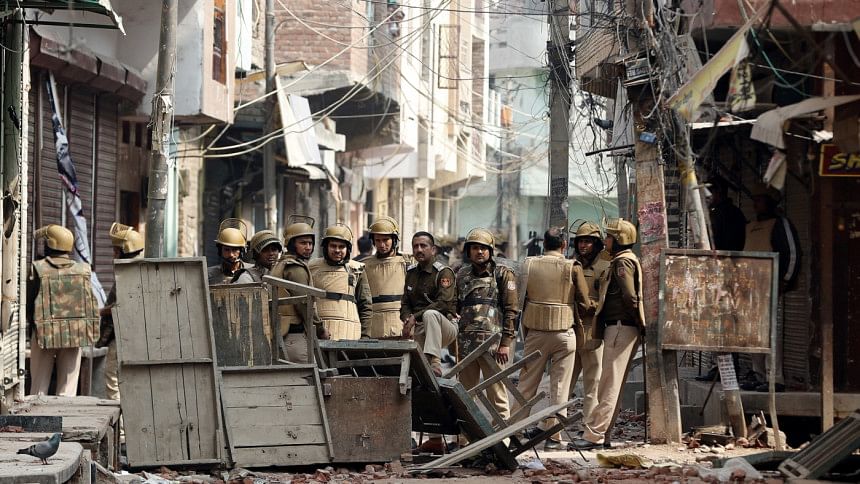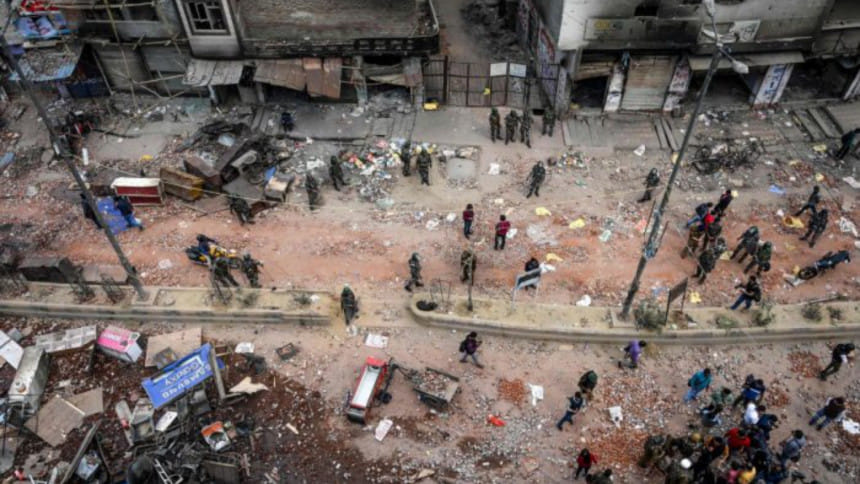The concept of sovereignty and internal affairs of state

When political events in the domestic sphere of a state transcend the internal space of that state, through a process of empathetic osmosis, and impacts negatively upon the domestic political and governance harmony of one or more neighbouring states around or adjacent to it, can such a matter be described as being "internal" to the state and barred from the domestic or international discourses of the other states affected by those events? This has become a burning question in the domestic political discourse, among Bangladeshi intellectuals as well as our "shadharon lok". The statement on the on-going state of communal clashes in India, between supporters and opponents of the recently enacted Citizen Amendment Act of India, issued by 12 eminent Bangladeshi citizens (reported by The Daily Star on Friday February 28), is testimony to this. All of these unquestionably eminent personalities are professed friends of India; one of them is a very highly respected academic and intellectual and distinguished honouree of the Indian Republic having been conferred with the Padma Vibhushan award, no less. My hunch, entirely personal perhaps: this is the tip of an iceberg! Can we measure the hidden dimensions and enormity of that iceberg merely from observing the tip?
In my op-ed of November 26 in this newspaper, I had referred to what at that time was still an issue simmering under the surface in India. I had referred, inter alia, to the perception in this country of the NRC (National Registry of Citizens) conundrum in Assam and some fairly incendiary remarks on illegal migrants by India's union home minister (or termites, as he unfortunately chose to describe them)—had raised the decibel level here in the questioning of Indian intentions towards Muslim Bengalis delisted as citizens by the NRC. People speculated, rather apprehensively, about the likely fate of the 400,000 non-Hindus. The passage, very shortly thereafter, of the Citizens Amendment Act by the BJP-dominated parliament revealed the answer all too clearly. Overnight, all these delisted persons had become non-citizens from that moment onwards (regardless of their personal histories or assertions of unverifiable fact), and that until deportation to some netherworld they were all liable to be sent into internment camps.
Like the 12 eminent citizens, I too, in my far less eminent, very unrecognised, and absolutely humble personal capacity, consider myself a friend of India, firmly committed to the idea that Bangladesh and India must maintain and sustain friendship and close cooperation in their own larger self-interests. But what if increasingly large segments of our population start agitating and questioning these premises. I cannot help but recall that the tragic, and currently ghastly, plight of the Rohingya people of Myanmar started with their community being delisted from Myanmar's list of recognised national ethnic entities who qualified for Myanmarese citizenship and all rights and services of the state. That one act, way back in 1982, led last year to the horrendous act of ethnic cleansing of the Rohingyas by the Myanmar regime and the exodus of over a million of those hapless, persecuted people streaming across into Bangladesh, seeking refuge. I cannot help but wonder, and speculate, and be fearful.
What is happening inside the length and breadth of India today is no doubt and absolutely, in Westphalian terms, an entirely internal matter of the sovereign state of India. We are bound by our own commitment to respecting the principles of sovereign jurisdiction of all states, and the rights of those states to their territorial integrity and non-interference in their internal affairs by outsiders. And of course, India has every right, as any sovereign state of the post-colonial, neo-Westphalian order that we all emerged into after 1945, to demand "hands off" on their internal matters.
Westphalia was, essentially a European construct, flowing from the Peace of Westphalia in 1648, and it took over two centuries to stabilise. In the pre-Westphalian order in Europe, states were theocratic, and the religious denominations were diametrically, and viscerally, opposed to each other. After the Peace of Westphalia, barred from fighting each other in their own backyards, European powers took their battles (and search for booties) far abroad to distant shores, to colonies that they established on distant lands from where they essentially extracted for their own self-gain. But in the process, they also transmitted to their colonised subjects their own ideas, even transplanted their own institutions and modes of governance, thus triggering latent sense of identities among communities they governed. Each newly awakened identity grouping aspired for its own Westphalian state. Eventually this growing estrangement—feeling of "otherness"—brought these sliced communities into violent, even primeval clashes with each other. When the era of colonisation ended, bloodily, it gave birth actually to a post-colonial, neo-Westphalian disorder. The newfound identities that emerged into their own space in the sun, still feel very insecure. Ironically, the many partitions that took place creating the "neo-Westphalian" disorder were sharply along religious lines. Mutual respect for each other is very fragile, equilibrium between the many self-righteous denominations for maintaining harmony not just brittle but always on the edge of spontaneous combustibility.

Samantha Besson in her seminal essay on sovereignty, published in the Max Planck Encyclopaedia of International Law, states citing Richard Falk, Professor Emeritus of Law, Princeton University, that "the history of the concept of sovereignty is one of 'conceptual migration'—different periods in history have generated different difficulties which in turn have influenced the legal answers sought to political problems and conditioned the function granted to sovereignty at any given time and space." She then goes on to assert that "the history of the concept of sovereignty is mostly European or Western, and related to European and Western developments, even in the second part of the 20th century."
The subject of sovereignty itself is quite vast and indeed very complex. In an admirable distillation of such a vastly complex subject, the Encyclopaedia Britannica presents it in the nearest equivalent to what journalists prefer so avidly—the ubiquitous sound-bite—describing it as "the ultimate overseer, or authority, in the decision-making process of the state and in the maintenance of order". In the same breath, it does admit that it is one of the most controversial of ideas in political science and international law, and also that it is "closely related to the difficult concepts of state and government, and of independence and democracy." When you try to blend this potpourri into a salad bowl (if one is pardoned this mixed metaphor), one may quite possibly end up with something the ingestion of which will result in quite severe heartburn at the very least. To go into a detailed discourse into this vast and complex realm here would be complicated, to say the least. Let us suffice with the assumption that the new world order that emerged after World War II is based on the concept of an international system of sovereign states. This is then enshrined in the United Nations Charter that states that "nothing should authorise intervention in matters essentially within the domestic jurisdiction of any state."
As heirs of the Partitioned colony that was Britain's Jewel in the Crown, we inherited the institutions that they transplanted on their colonised territories. The pH factors of the foreign soil in which those saplings were transplanted was unsuited, if not outrightly hostile, to the imported saplings which did not quite grow into what they were in their land of origin—they mutated into flawed replicas. Not inexplicably, while we are distinctly separate, inviolable sovereign entities post-1947, we have been operating largely with same flawed institutions we inherited from our common colonial masters. Regardless of the splicing, our peoples, across borders, continue to be still attached to each other by some inexplicable, still communicating strands of their common umbilical cord, and still react to and resonate with each other, emotionally, psychologically, empathetically. In the original European Westphalian order, religious divisions remained but linguistic and religious minorities who find themselves on the wrong side of borders over the next two centuries became settled in their new states. French speaking, or German-speaking, or Italian speaking minorities professing a different religious affiliation became absorbed in their new national skins. As a result, French-speaking minorities in Switzerland or elsewhere in Europe became comfortable in their newly assumed Westphalian identities. They have no identity crisis in terms of where they belong, nor are fearful of being gobbled up by anyone (divided Irish being notable exceptions).
In the neo-Westphalian disorder in South Asia, each and every state, post-1947, has one or more minorities. One's minority is the other's majority, and vice versa. Each component cannot remain aloof from what happens to their alter egos across the recently drawn borders." How often has India voiced its concern publicly, officially or unofficially, to the plight of minorities (Hindus, Buddhists, Sikhs, Christians, Tamils) living across their borders, in a different "sovereign" state? As recently as November 7, 2016, during the halcyon days of our bilateral relationship, then Indian External Affairs Minister Sushma Swaraj had raised with us her country's concern about the plight of Hindus in Bangladesh. Let us not also forget here that Pakistan had also screamed "internal matter" to the world when brutalising us in 1971, as indeed Myanmar continues to do today in response to the international community's expressions of concerns about their atrocious and unacceptable handling of the Rohingyas in Rakhine State. So, let us not seek shelter behind this "internal" shield any more. More often than not, afflicted as they are with a peculiar bipolarism, to the common citizens, nothing is exclusively "internal" on the other side of the fence.
We would all do well to remember that when we hold up the mirror to ourselves, each and every one of us, we shall see our own face.
Tariq Karim is a retired Ambassador and currently
Senior Fellow at the Independent University,
Bangladesh.

 For all latest news, follow The Daily Star's Google News channel.
For all latest news, follow The Daily Star's Google News channel. 



Comments